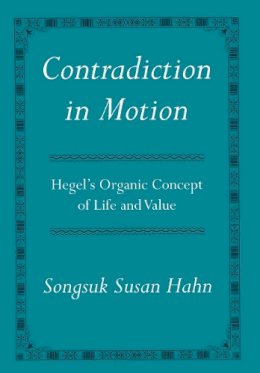
Contradiction in Motion: Hegel´s Organic Concept of Life and Value
Songsuk Susan Hahn
"Everything is contradictory," Hegel declares in Science of Logic. In this analysis of one of the most difficult and neglected topics in Hegelian studies, Songsuk Susan Hahn tackles the status of contradiction in Hegel's thought. Properly philosophical thinking in the Hegelian mode recognizes that contradiction pervades all organic forms of life. Contradiction in Motion presents Hegel's doctrine of contradiction, once widely dismissed, as one deserving serious consideration. The book argues that contradiction is not a sign of error or incoherence, but rather plays an important role in the development of Hegel's system.
The first part of the book sets up Hegel's logic of organic wholes in such a way as to motivate his claim that everything is contradictory. Hahn explores how Hegel tests his abstract logical and methodological apparatus against the more concrete, unmanageable aspects of empirical nature. The second and third parts of the book examine the extent to which Hegel's organic model informs his aesthetics and ethics. Hahn reveals the privileged role of art forms in expressing our consciousness of organic unity and shows how Hegel's organic-holistic conception of cognition and nature, with its distinctively contradictory stance, can be incorporated coherently into his ethics.
Product Details
About Songsuk Susan Hahn
Reviews for Contradiction in Motion: Hegel´s Organic Concept of Life and Value
Allen Wood, Stanford University, author of Kant and Kant's Ethical Thought "This is an interesting, suggestive, and well-conceived book that interrelates a number of important and, to a significant extent, neglected topics in the recent renaissance in Anglophone Hegel studies. Songsuk Susan Hahn links the theme of contradiction in Hegel to his philosophy of nature and then engages with Hegel's treatment of the cognitive dimension of tragic drama and issues of ethics and agency."
Paul Redding, The University of Sydney, author of Hegel's Hermeneutics and The Logic of Affect
